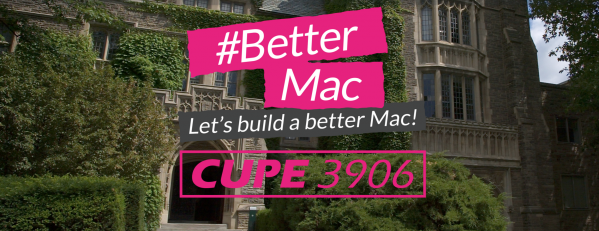On September 26, Teaching Assistants will head back to the table with McMaster for the first time in a month. We expect to meet several times over the next two weeks, with Postdoctoral Fellows slated to return to the table on October 5 and 6. Expect more updates soon, but in the meantime, it’s worth recapping where we’re at so far.
|
What are we asking for? |
What is the university’s response? |
|
Wage increases that help TA’s and Postdocs get ahead, rather than falling further behind. |
No response. |
|
Enhanced and expanded benefits, including reproductive health funds and leaves. |
No response. |
|
Protections against future tuition increases in the form of a reimbursement, like they have at U of Ottawa and Carleton. |
No response. |
|
Equal pay for equal work for Undergraduate TA’s. |
No response. |
|
Expanded TA training program, offering more paid opportunities to further enhance teaching excellence. |
No response. |
|
Extended work guarantees for graduate students, like they have at U of Toronto, York, and Carleton. |
No. |
|
A modest, portable retirement savings program for Postdocs, like they have at Waterloo, TMU, and Ontario Tech U. |
No. 35 years old on average is “too young” to be worried about that.” |
McMaster’s Institutional Priorities and Strategic Framework lists “inclusive excellence,” “teaching and learning,” and “research and scholarship” among its top priorities. The university aspires to “be the go-to place for world-class researchers,” but the minimum salary for Postdoctoral Fellows is just $36,200/year. Every year, world-class researchers are actually being lost to other universities or to the private sector, while McMaster sits on its hands and refuses to talk about Postdoc compensation.
McMaster is also home to over 2,600 Teaching Assistants and Research Assistants-in-lieu, almost all of whom are graduate or undergraduate students. Our work is essential to the functioning of the university, and despite this, many of us struggle to cover basic needs like rent, groceries, and utilities. After we pay our tuition, which is a defacto condition of employment for most TAs, graduate TA’s are left earning roughly $16-19/hour, depending on our programs. Undergraduate TA’s earn approximately 40% less than graduate TA’s, for no good reason, aside from offering the university a source of discounted labour. There is also nothing to prevent future tuition increases from further eroding TA income on top of the damage already being done by once-in-a-generation inflation.
Everything that we’re asking for is about helping McMaster live up to its vision of “inclusive excellence” by making the university a better place to work and study. But we need your help. Every pay period that goes by without new Collective Agreements, essential academic workers at McMaster fall further and further behind the rising cost of living.
Please send a message of support to our bargaining teams. Share this update and your support for our priorities on social media with the hashtag #bettermac. We’re also calling on all members of the union to join the Bargaining Support Committee to organize and rally support behind our bargaining teams. If you haven’t done so yet, please sign the open letter calling on the university to Raise the Floor on graduate funding as well.
Our work is valuable. We deserve so much better than this.
